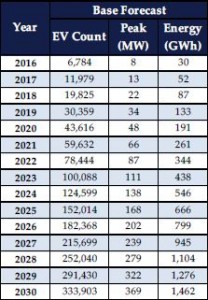by James A. Bacon
The market for electric vehicles has not matured as rapidly as many proponents hoped, and the low price of gasoline in the past year hasn’t helped. But when EVs do attain mass-market status, as eventually they will, there is a good chance that a crucial innovation helping them get there will have come out of Virginia. Evatran Group, a six-year-old, Richmond-based startup, has emerged as the country’s leading maker of wireless recharging technology, addressing a big drawback to electric vehicles: the hassle of recharging.
The company’s website describes the value proposition this way: “Hands-Free, Hassle-Free.”
With the Plugless L2 System, you simply pull into your parking space and your EV starts charging automatically. No dirty cords to untangle and no chance of forgetting to charge. The wall-mounted Control Panel guides you as you approach the Parking Pad to ensure correct alignment. Most people get it on their first try!
Writing in Style Weekly, Peter Galuszka describes how 29-year-old Rebecca Hough co-founded Evatran with her father shortly after graduating from the McIntire School of Commerce in 2008. With early-stage financing from New Richmond Ventures, the company has grown to the point where its wireless charger can be installed in the automotive after-market for 60% of the EVs sold in the United States. Additionally, Evatran is raising $10 million in Series B financing to sell plugless units in China.
 Bacon’s bottom line: Like the quip about Brazil — it’s the country of the future, and always will be — electric vehicles have been touted as the cars of the future for 15 or 20 years now. But venture capitalists and automobile companies are committing serious money to EVs, the rate of technological innovation seems to be accelerating, and the price of gasoline won’t stay below $2 per gallon forever. Within the foreseeable future, there will be millions of EVs on the road.
Bacon’s bottom line: Like the quip about Brazil — it’s the country of the future, and always will be — electric vehicles have been touted as the cars of the future for 15 or 20 years now. But venture capitalists and automobile companies are committing serious money to EVs, the rate of technological innovation seems to be accelerating, and the price of gasoline won’t stay below $2 per gallon forever. Within the foreseeable future, there will be millions of EVs on the road.
While contemplating the inevitable rise of the EV, it’s worth thinking about the implications for the future of the electric grid. It seems prudent to draw at least two conclusions.
First, electric vehicles will boost the demand for electricity. In its 2015 Integrated Resource Plan, Dominion Virginia Power projected that there will be 334,000 electric vehicles and plug-in hybrid electric vehicles on the road in its service territory by 2030, which would translate into 369 megawatts of peak load and an annual energy usage of 1,462 gigawatts from charging.
Second, EVs will drive a shift in the electricity load. Assuming most recharging occurs while cars are parked at home, EVs are expected to boost demand in the evening and night-time hours. That could be either a blessing or a curse. During the summer, peak electricity loads occur in late afternoon when temperatures are still high and people come home from work and turn on appliances. If they plug in their cars at that time, EVs could seriously strain the electric grid. However, if people wait until late in the evening when electricity demand slackens, EVs could reduce the gap between peak and non-peak loads, making it easier for utilities to balance the load. Better yet, Night-time recharging of EVs would boost the market for clean wind power, which blows most reliably at night.
Virginia policy makers need to ensure that the load shift to later, off-peak hours takes place.
Dominion is more than four years into a pilot program to shave peak power load by offering EV users voluntary, experimental rates to charge their cars during off-peak hours. The program provides two options. A “whole house” rate provides a preferential off-peak rate for both premises and vehicle. An “EV only” rate provides the off-peak rate for just the vehicle. As of April 2015, 377 customers were enrolled in the whole-house program, and 119 in the EV-only rate. The pilot program extends to November 2018.
The number of participants falls far short of the 1,500 total allowed under the State Corporation Commission (SCC) order. Hopefully, Dominion will have learned enough from the trial that the SCC can seriously consider enacting a long-term, demand-shaving tariff. If not, the commission needs to identify ways to boost participation to the point where valid conclusions can be drawn.
As a bonus, EvaTran could be well positioned to benefit. If Evatrans’ automatic-recharging system can be programmed to recharge during certain hours and not during others, the product will eliminate another hassle factor: remembering when the lower tariff goes into effect and going to the garage late in the evening to manually insert the charger into the car. Such a synergy would be a boon both to consumers and to one of Richmond’s rising entrepreneurial stars.
Editor’s note: I have updated the article to incorporate more up-to-date data on the pilot program from Dominion. — JAB



